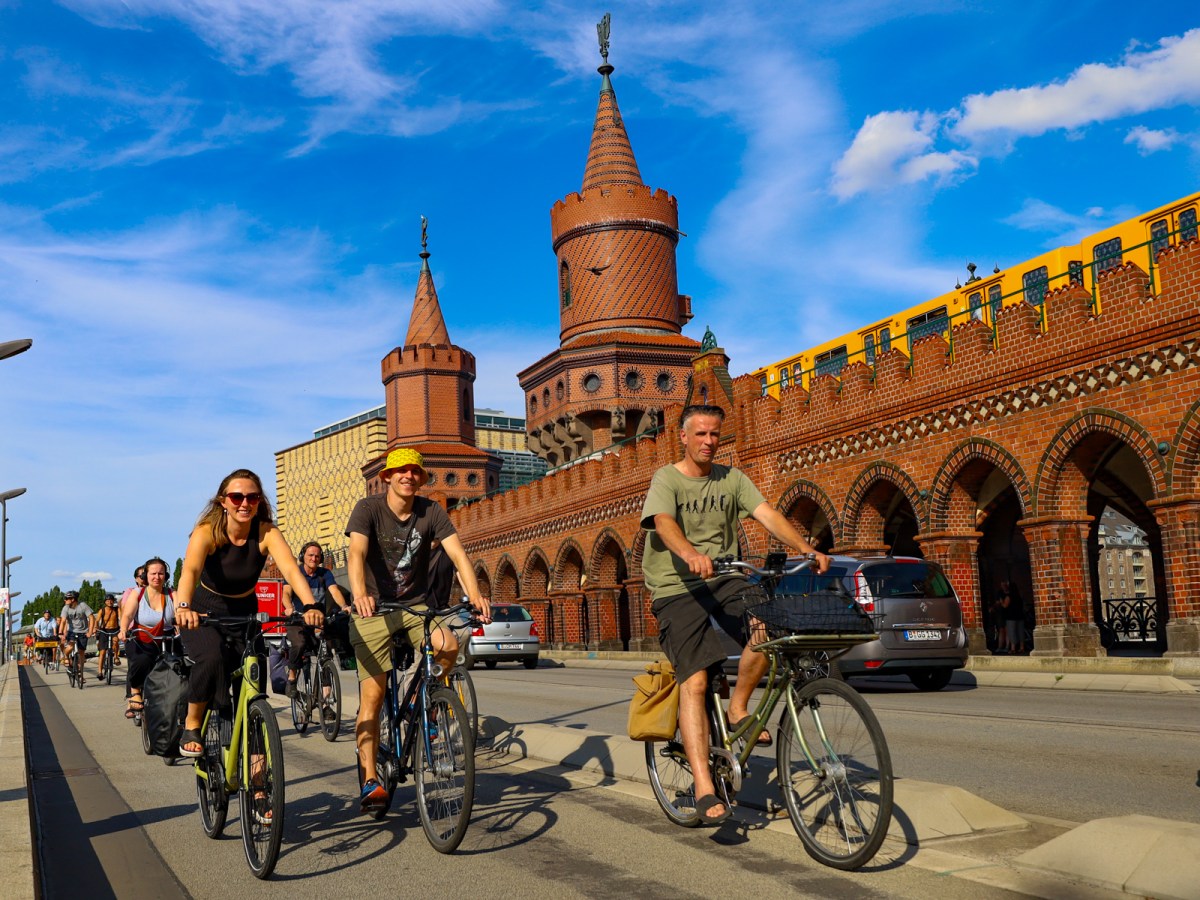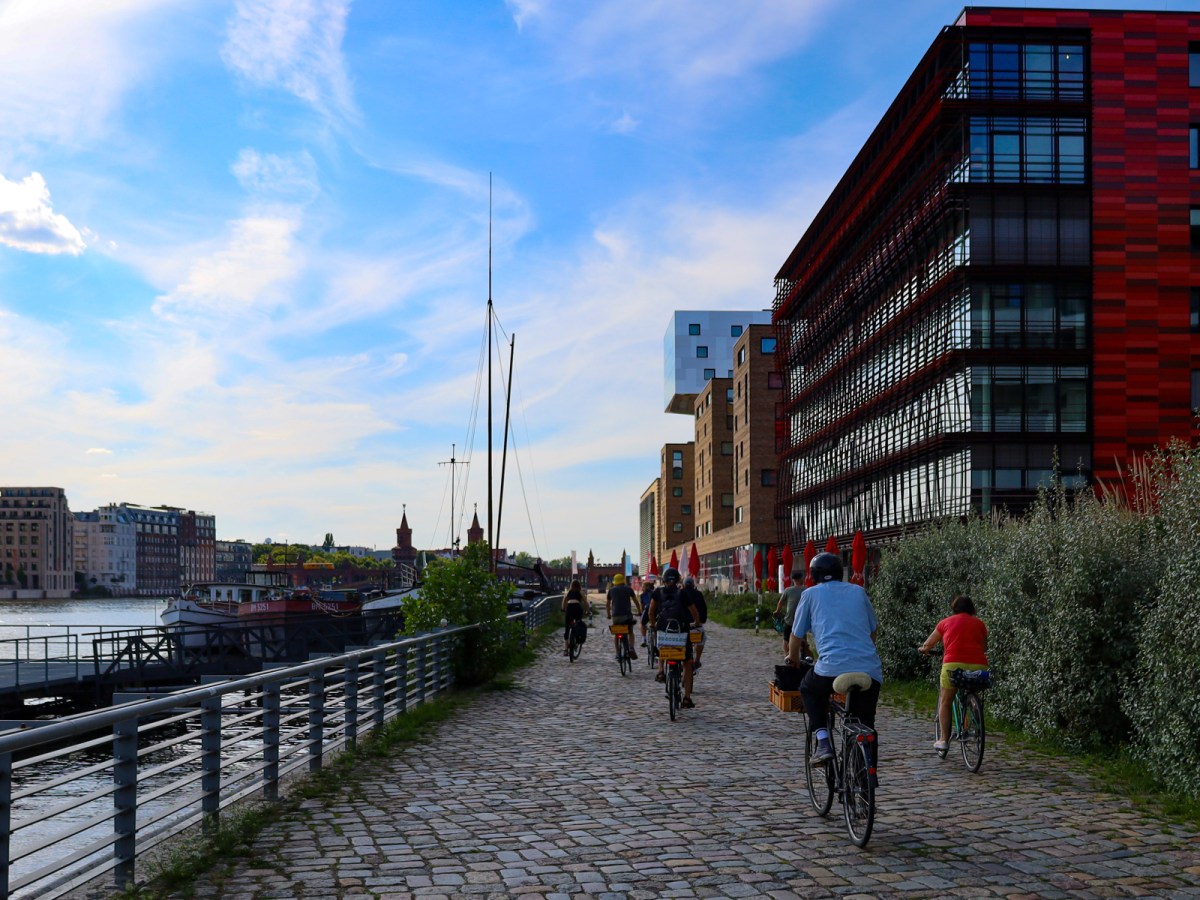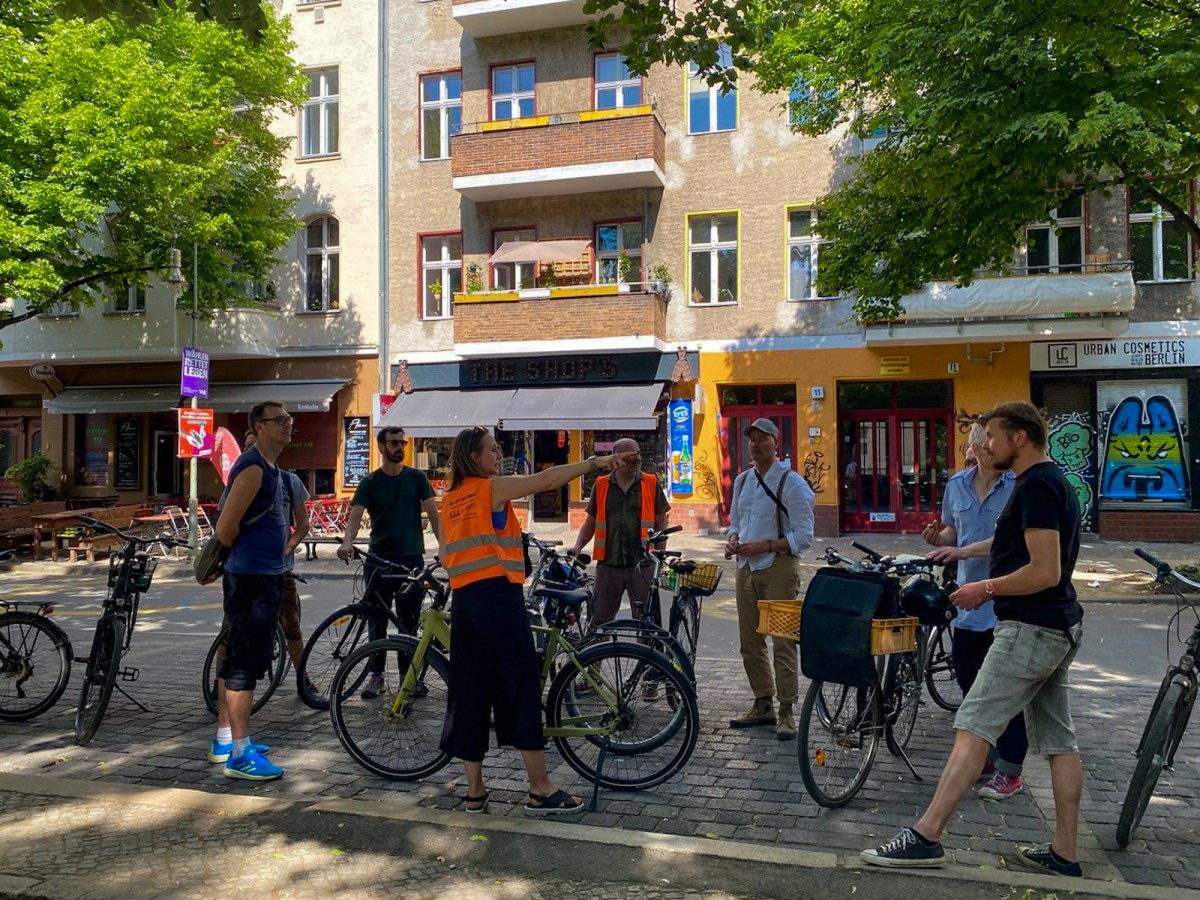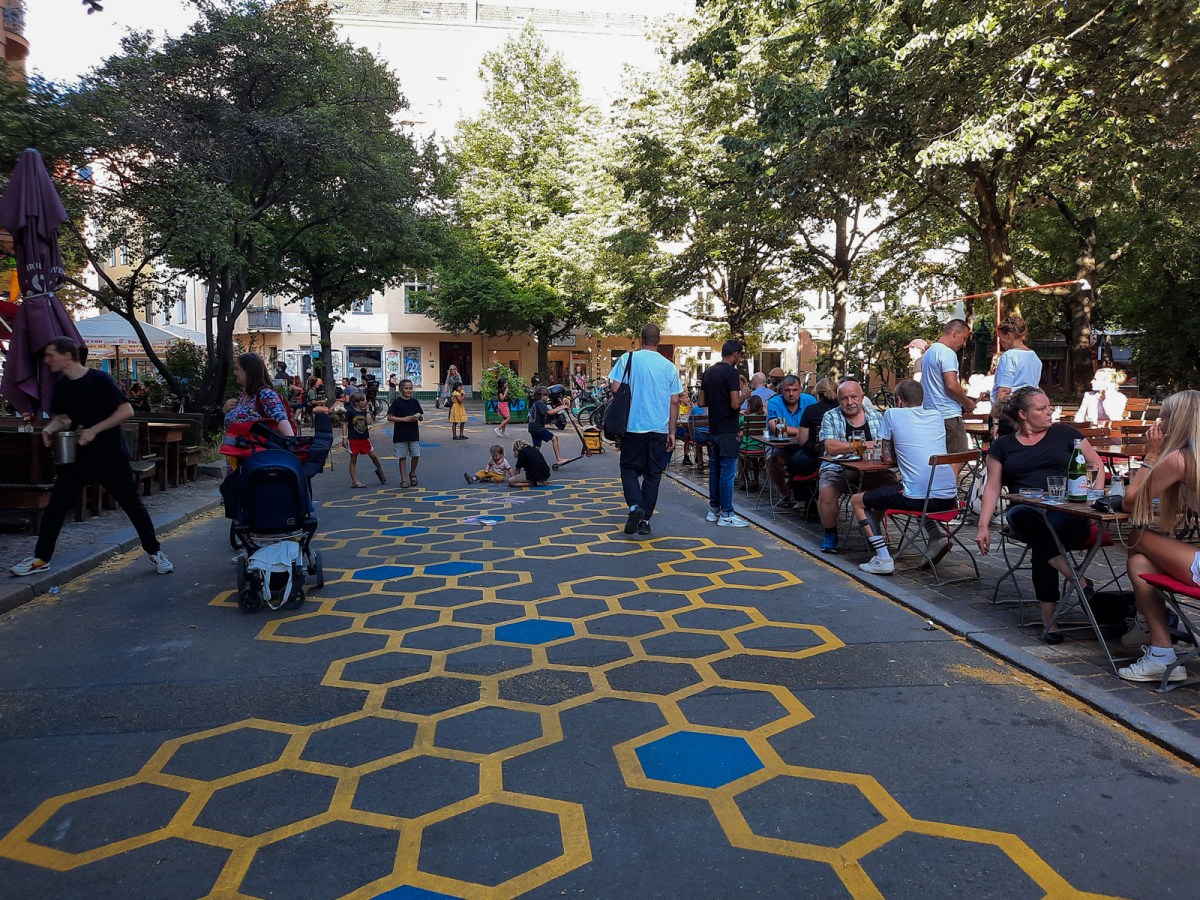Professional Study Tours
Are you part of a public or private organization working in mobility, urban planning, or climate change? Are you seeking inspiration from other cities to shape your urban strategies or projects, while engaging in meaningful discussions about urban transformation with your colleagues?
Now is your chance! Starting this year, Berlin on Bike is proud to offer customized study tours designed specifically for professionals like you.
Berlin on Bike: Your Guide to Urban Transformation
For over 20 years, Berlin on Bike has been offering tailor-made bike tours. Topics such as urban development, transportation planning, and sustainable mobility have become an increasing focus. Our guides bring diverse expertise, including urban planners and architects, who provide practical insights and in-depth knowledge.
With more than two decades of experience, we not only know the stories behind Berlin’s neighborhood transformations but also understand the details of its evolving infrastructure, changing business landscapes, and social transitions. These insights make us a unique partner for addressing the challenges and opportunities of urban development.
For us, the bicycle is more than just a means of transportation – it’s a tool to experience urban spaces firsthand. Our tours enable participants to gain a direct understanding of Berlin’s projects and urban transformations.
Our workshops and tours combine professional expertise with practical examples that can be experienced directly on-site. We tailor the content to the specific focus areas of your company or team.
Experience the transformation and future of Berlin with us – sustainable, mobile, and inspiring!

Mobility Tour
Intermodality & bottom-up street transformation
Berlin, renowned for its extensive public transport network, has a mobility story shaped by two world wars and the Cold War. Today, the city is expanding its transit system while adopting forward-thinking concepts like Mobility as a Service (MaaS) to integrate shared mobility solutions.
After World War II, traffic planning in East and West Berlin focused on a “car-oriented city”, transforming public spaces into roads and parking lots. This legacy persists in noise, pollution, and traffic accidents. However, with the lowest car ownership rate in Germany, Berlin is shifting away from car-centric policies, fueled by public opposition to projects like the A100 highway extension.
A turning point came in 2018 with Berlin’s pioneering mobility law, developed through citizen input to prioritize walking and cycling while reimagining streets for people. Despite its ambitious goals, implementation faces hurdles, including Berlin’s decentralized government and resistance from various stakeholders.
This study tour examines Berlin’s mobility evolution—from its historical roots to current policies and challenges—offering insights and inspiration for sustainable urban transport solutions.

Climate Resilience Tour
Circularity & blue-green infrastructure
Climate change presents Berlin with major challenges: urban heat islands, droughts, and extreme rainfall. To tackle these issues, the city is working to reduce CO₂ emissions, such as by promoting sustainable timber construction, while also adopting measures to adapt to climate impacts.
In this workshop and bike tour, we explore innovative projects making Berlin more resilient. How does preserving the Haus der Statistik save embodied carbon and energy? How is the Spreekanal being transformed into a recreational cooling zone? We also examine how urban gardening and green roofs enhance biodiversity and mitigate urban heat, while redesigned spaces prioritize pedestrians and cyclists over cars, with permeable surfaces helping manage stormwater.
Discover how local initiatives and green infrastructure projects are shaping a sustainable, climate-adapted Berlin, ensuring the city remains livable for generations to come.

15-minute City Tour
Superblocks & multifunctional densification in the polycentric city
The late Industrial Revolution transformed Berlin from a bunch of sleepy old villages into one of Europe’s largest and most densely populated metropolises. Distances were short, and streets often served as vibrant public spaces. After the city’s division into East and West, two distinct urban planning paradigms emerged, both focusing on increasing division of urban functions and space for private cars. Particularly in the West, residents resisted many unsustainable developments, taking urban transformation into their own hands.
This bottom-up culture remains vibrant today. As Berlin continues to densify and attract investment, NGOs, researchers and many other organizations are advocating for accessible services and inclusive public spaces. Also, the government has been taken the 15-minute city as a source of inspiration aiming for similar goals. Inspired by Barcelona’s superblocks, Berlin is currently creating its own version—Kiezblocks.
This study tour highlights both positive and negative historical practices of urban densification and provide insights into what makes a successful 15-minute city and Superblock.

Inclusive City Tour
Gentrification, gender & access for all
Once one of Europe’s most affordable capitals, Berlin became a hub for creative minds and cultural professionals. Today, rising rents and gentrification are reshaping the city. Who can still afford to live here? How much space remains for the art, culture, and diversity Berlin is known for?
After the fall of the Wall, Berlin was filled with vacant buildings and unused spaces. Now, global pressures have intensified the fight for affordable housing. How can neighborhoods preserve their social mix while providing room for art and culture? This workshop and tour explores solutions, from affordable housing initiatives to vibrant community projects that resist the pressures of gentrification.
We’ll also delve into Berlin’s tradition of alternative living models – squats, trailer communities, and cooperatives – that foster social cohesion and offer sustainable urban solutions. With its strong “bottom-up” approach to urban planning, Berlin is shaped by citizen-led projects that make the city more inclusive and livable.
Discover how Berlin’s innovative and community-driven initiatives are working to keep the city open, creative, and equitable for everyone.
General programme of a study tour
| Time | Agenda Item | Description |
|---|---|---|
| ⏰ 1 h | Introduction Workshop | Introducing the general topic of the tour and discussing what is happening on a policy/strategic level in Berlin. |
| 🚲 1.5 h | Bike Ride (Historical Perspective) | Focusing on the historical development of Berlin on the topic of the tour. |
| 🍴 1 h | Lunch Break (included) | A lunch break in a Berlin restaurant including some relaxation and networking opportunities. |
| 🚲 1.5 h | Bike Tour (Current Projects) | Exploring current projects and initiatives related to the topic of the tour. |
| 💡 1 h | Conclusion Workshop | Discussing findings, learnings and how policies or projects can inspire your organization. |
Every study tour takes about 6 hours.
Frequently Asked Questions
-
All public and private organizations with an interest in mobility, urban planning and/or climate change. For example:
- Local governments (or associations of combined local governments)
- Regional governments (or associations of combined regional and local governments)
- NGOs dealing with one of the tour topics (or combined NGO groups)
- Private consultancy firms (or combined groups)
- Private investors and/or property developers (or combined groups)
- Housing associations
- Universities and other higher educational or research institutions.
- Political representatives
- All other interested public or private groups
-
Berlin serves as a prime example of the complexities of urban development. The unification of two major cities overnight, combined with the arrival of over 400,000 new residents since 1989, has reshaped the city. This transformation includes changes in traffic patterns, the repurposing of old industrial sites (particularly in the east), and the emergence of new business districts often located next to former problem areas.
A defining feature of Berlin’s urban planning is its “bottom-up” approach. Many urban development projects have been initiated by the city’s engaged citizens. This participatory method has significantly shaped Berlin’s urban identity. On our tours, we demonstrate how this approach works in practice, showcasing both successful examples of urban transformation and projects where promising ideas failed – and exploring the reasons behind these outcomes. Together, we analyze well-executed planning efforts and discuss ongoing challenges for sustainable urban development, balancing theory with practical examples.
-
The tour is open for any organisation with an interest in the specific tour themes. Preferably your group or the individuals in the group are already working or studying on the specific theme and have some background knowledge.
-
Out of experience we know that study tours and discussions are best to be held in small groups, varying from 6 to 12 people. If you’re with a smaller or larger group, the study tours can off course still be organized. Potentially extra costs will arise, with an extra expert guide required to join the study tour and host the moderation of the workshops.
-
The tours, including bikes, food, workshop moderation and much more (see other FAQ) are available from 890€ per group. This is the price for 6 persons. Every person more joining the tour is 40€. The following table describes the costs up until 15 people (the ultimate max of participants per group).

A discount of 10% is applicable when booking 2 study tours or more. For example, booking two study tours with 6 participants would costs 1.602€ instead of 1.780€.
-
Included:
- Bike rental (including non-obligatory to wear helmet)
- Experienced tour guide
- Workshop room and moderator (including moderations tools, coffee/tea and small snacks)
- Lunch at the restaurant (including one free drink)
- Possible public transport ticket with bike ticket as part of the tour
Not included:
- VAT
- Travel to the start point of the tour (Kulturbrauerei)
- Extra drinks during the tour or during lunchtime.
- E-Bikes (20€ per bike for an E-Bike upgrade)
- In case of an alternative end of starting point of the tour, the pick-up of bikes is subject to an extra fee.
-
In the booking inquiry form, you are asked to already indicate your preferred dates. The administration will be in touch with you and indicate within 3 days in an email which Berlin on Bike study tour experts are available on the preferred dates.
-
When an agreement on the date and time of the tour has been made, we will organize a 30-minute online talk (Zoom, MS Teams or other tool) with a representative of your organization. During this talk you will discuss specific wishes for the tour, for example certain subtopics or projects you would prefer to visit. We aim to accommodate to these preferences, but of course make sure the feasibility of doing the study tour is still in place.
-
The study tour normally starts and ends at the Kulturbrauerei in Prenzlauer Berg in Berlin (Knaackstraße 97, 10435 Berlin). At this location we also have a workshop room available, which we will use at the start and end of the study tour. Specific wishes for alternative start and end points can be agreed on, but would limit the options for the start and end workshop.
-
Yes, this is possible. When booking two or more tours, we will make sure that during the two different study tours different workshop methods are applied and the group visits different areas and projects. Potentially also different experts will be your guide during these two days. It is not obligatory to book two consecutive days, but you can also have one or two days ‘off’ between the two study tours.
-
Unfortunately, we do not have the tours offered as open tours yet. This means you have to apply as an organization or private group. However, stay tuned on our website. Because we plan to organize open tours back-to-back to major mobility and urban planning events happening in Berlin.
-
Out of experience we know that study tours provide inspiration and learnings and can be used as a tool for policy transfer. Also in research, the added value of study tours has been confirmed. Glaser et al. (2021) for example indicate that study tours on the topic of mobility have contributed to individual learning, leadership participation, knowledge integration activities, and positive group dynamics. So enough reasons for your organisation to book a study tour.
Source: Glaser et al (2021). Learning from abroad: An interdisciplinary exploration of knowledge transfer in the transport domain.
-
All tours are offered in English and German. Several of our experts also speak Dutch and Spanish. However, we cannot guarantee that they are available for your specific tour or date. During the preparation of the tour we will discuss language wishes as well.
Enquiry for Institutions / Companies
*Required fields
